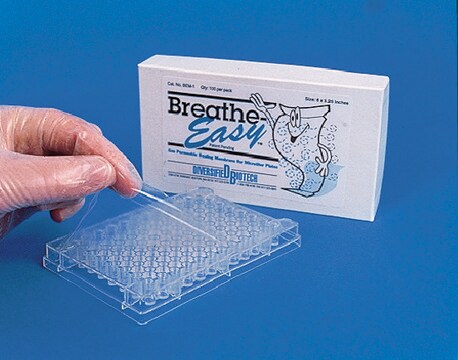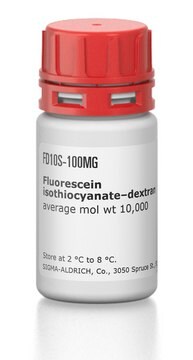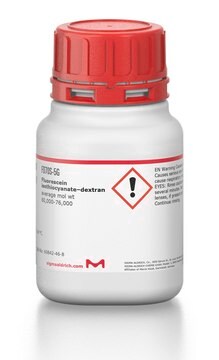추천 제품
생물학적 소스
mouse
Quality Level
항체 형태
purified antibody
항체 생산 유형
primary antibodies
클론
26-2F, monoclonal
종 반응성
human
기술
immunocytochemistry: suitable
immunohistochemistry: suitable
inhibition assay: suitable
동형
IgG1κ
NCBI 수납 번호
UniProt 수납 번호
배송 상태
wet ice
타겟 번역 후 변형
unmodified
유전자 정보
human ... ANG(283)
일반 설명
Angiogenin (Ang) is a non-glycosylated polypeptide, 123 amino acids in length, with a molecular mass of 14 kDa. It is secreted by tumor cells and is a potent inducer of neovascularization. Angiogenin is produced by a variety of cell types including vascular endothelial cells and smooth muscle cells, fibroblasts, tumor colonic epithelium, normal peripheral blood lymphocytes, lung and colonic epithelial tumor cell lines, and primary gastrointestinal adenocarcinomas. It specifically binds to endothelial cells and elicits second messenger systems. Angiogenin is present in human follicular fluid, and its production is up-regulated by human chorionic gonadotropin and hypoxic conditions. Angiogenin shows a high degree of homology with known ribonucleases such as pancreatic ribonuclease A, and the capacity of angiogenin to induce blood vessel growth is dependent on its ribo-nucleolytic activity. Angiogenin is thought to be involved in the development of solid tumors; angiogenin antagonists are capable of inhibiting tumor growth. Angiogenin is endocytosed by subconfluent endothelial cells and translocated to the nucleus, where it accumulates in the nucleolus. Serum angiogenin concentration is increased in serum of colorectal cancer patients, and correlates with cancer progression. The cytoskeletal protein α-actinin-2 binds to angiogenin, which might be a novel interface target for anti-angiogenesis and anti-tumor therapy.
면역원
Purified Human Angiogenin.
애플리케이션
Inhibition Assay: A representative lot of this antibody blocked cell-free protein synthesis by angiogenin (Fett et al., (1994) Biochemistry. 33(18):5421-5427).
Inhibition Assay: A representative lot of this antibody inhibited ribonucleolytic activity (Piccoli et al., (1998) Proc. Natl. Acad. Sci. 95:4579–4583).
Immunohistochemistry Analysis: A representative lot of this antibody detected Angiogenin in Neovessels of cancer tissue (Tsuji et al., (2005) Cancer Res. 65:1352-1360).
Immunocytochemistry Analysis: A representative lot of this antibody detected Angiogenin in HeLa and Huvec cells (Tsuji et al., (2005) Cancer Res. 65:1352-1360).
Inhibition Assay: A representative lot of this antibody inhibited ribonucleolytic activity (Piccoli et al., (1998) Proc. Natl. Acad. Sci. 95:4579–4583).
Immunohistochemistry Analysis: A representative lot of this antibody detected Angiogenin in Neovessels of cancer tissue (Tsuji et al., (2005) Cancer Res. 65:1352-1360).
Immunocytochemistry Analysis: A representative lot of this antibody detected Angiogenin in HeLa and Huvec cells (Tsuji et al., (2005) Cancer Res. 65:1352-1360).
Research Category
Apoptosis & Cancer
Apoptosis & Cancer
Research Sub Category
Apoptosis - Additional
Apoptosis - Additional
This Anti-Angiogenin Antibody, clone 26–2F (Azide Free) is validated for use in Immunocytochemistry and Inhibition and Immunohistochemistry for the detection of Angiogenin.
품질
Evaluated by Immunocytochemistry in HeLa cells.
Immunocytochemistry Analysis: A 4 µg/mL of this antibody detected Angiogenin in Angiogenin-treated and untreated HeLa Cells. HeLa cells that were treated with Angiogenin up-took the protein and translocated it to the nucleus. Untreated HeLa cells did not exhibit any Angiogenin protein signal.
Immunocytochemistry Analysis: A 4 µg/mL of this antibody detected Angiogenin in Angiogenin-treated and untreated HeLa Cells. HeLa cells that were treated with Angiogenin up-took the protein and translocated it to the nucleus. Untreated HeLa cells did not exhibit any Angiogenin protein signal.
표적 설명
16 kDa calculated
물리적 형태
Format: Purified
Protein G Purified
Purified mouse monoclonal IgG1κ in buffer containing PBS without preservatives.
저장 및 안정성
Stable for 1 year at -20°C from date of receipt.
Handling Recommendations: Upon receipt and prior to removing the cap, centrifuge the vial and gently mix the solution. Aliquot into microcentrifuge tubes and store at -20°C. Avoid repeated freeze/thaw cycles, which may damage IgG and affect product performance.
Handling Recommendations: Upon receipt and prior to removing the cap, centrifuge the vial and gently mix the solution. Aliquot into microcentrifuge tubes and store at -20°C. Avoid repeated freeze/thaw cycles, which may damage IgG and affect product performance.
기타 정보
Concentration: Please refer to lot specific datasheet.
면책조항
Unless otherwise stated in our catalog or other company documentation accompanying the product(s), our products are intended for research use only and are not to be used for any other purpose, which includes but is not limited to, unauthorized commercial uses, in vitro diagnostic uses, ex vivo or in vivo therapeutic uses or any type of consumption or application to humans or animals.
적합한 제품을 찾을 수 없으신가요?
당사의 제품 선택기 도구.을(를) 시도해 보세요.
Storage Class Code
12 - Non Combustible Liquids
WGK
WGK 2
Flash Point (°F)
Not applicable
Flash Point (°C)
Not applicable
시험 성적서(COA)
제품의 로트/배치 번호를 입력하여 시험 성적서(COA)을 검색하십시오. 로트 및 배치 번호는 제품 라벨에 있는 ‘로트’ 또는 ‘배치’라는 용어 뒤에서 찾을 수 있습니다.
Aleksej Drino et al.
Nucleic acids research, 51(3), 1326-1352 (2023-02-01)
Stress-induced tRNA fragmentation upon environmental insult is a conserved cellular process catalysed by endonucleolytic activities targeting mature tRNAs. The resulting tRNA-derived small RNAs (tsRNAs) have been implicated in various biological processes that impact cell-to-cell signalling, cell survival as well as
자사의 과학자팀은 생명 과학, 재료 과학, 화학 합성, 크로마토그래피, 분석 및 기타 많은 영역을 포함한 모든 과학 분야에 경험이 있습니다..
고객지원팀으로 연락바랍니다.





